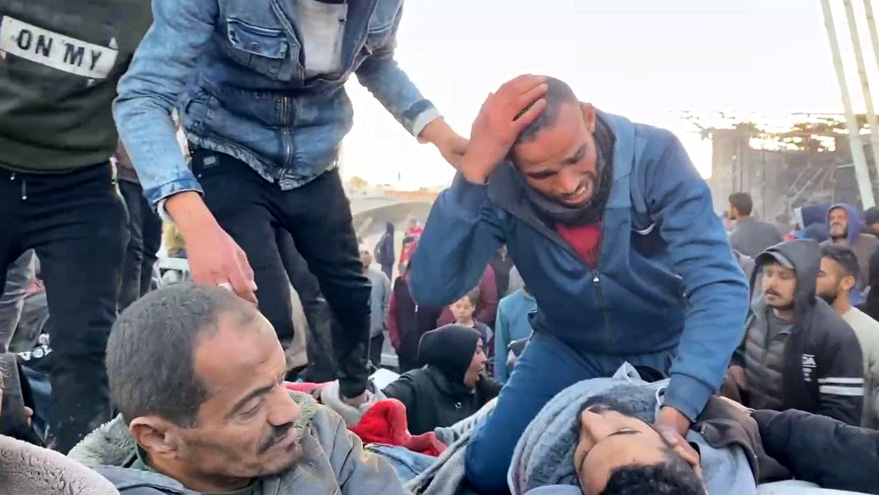
AT LEAST 104 Palestinians, gathered in anticipation of receiving food aid amidst a severe hunger crisis, were killed and another 760 injured in a series of attacks by Israeli forces yesterday.
This incident took place southwest of Gaza City, where hundreds had congregated, hoping to receive sustenance. Israeli air strikes and artillery fire also claimed lives in the Nuseirat, Bureij, and Khan Younis refugee camps, with a total of 30 people killed in these separate assaults.
The Palestinian Foreign Ministry vehemently denounced these actions as a ‘cold-blooded massacre’, part of what it terms Israel’s ‘genocidal war’, urging international intervention to halt the violence and protect civilians.
Eyewitnesses reported a harrowing scene at al-Rashid Street, where people had gathered with the hope of receiving flour from incoming aid trucks.
According to these accounts, Israeli forces opened fire on the crowd, leading to numerous fatalities and injuries. One distressed witness recounted, ‘We went to get flour. The Israeli army shot at us.
‘There are many martyrs on the ground and until this moment we are withdrawing them. There is no first aid.’
Further reports from the ground described Israeli tanks moving in after the shooting, causing additional casualties by running over the bodies of those already dead or injured.
Ambulances were unable to access the area due to extensive road damage, forcing the transport of the dead and wounded to four medical facilities by alternative means.
The crisis was further compounded by the dire state of Gaza’s medical facilities, which, overwhelmed by the influx of casualties, faced critical shortages of fuel, medicine, and blood.
Eyewitnesses and victims of the attack voiced their despair and confusion.
Medical professionals, including Jadallah Al-Shafei from al-Shifa Hospital, described the influx of casualties as overwhelming, with many victims presented with gunshot wounds and shrapnel injuries primarily to the head and upper body.
Israel imposes visa freeze for foreign aid workers
ISRAEL has instituted a visa freeze for international humanitarian staff working within the occupied Palestinian territories, critically obstructing the flow of essential aid, including food, to Gaza.
This decision has necessitated the departure of numerous foreign aid workers, including organisation leaders, either because they have left Israel and the Palestinian territories or are overstaying their visas, thereby facing potential deportation to sustain their humanitarian efforts, as indicated by an association of aid groups.
Faris Arouri, director of the Association of International Development Agencies (AIDA), an umbrella organisation for aid entities in the West Bank and Gaza, highlighted the plight of emergency response teams.
‘They are deployed on short notice from regional headquarters to deal with unexpected crises, but the visa block means aid groups have not been able to bring any experts into Jerusalem, from where most aid to Gaza is coordinated,’ Arouri explained.
The requirement for visas for entry into Israel and the Palestinian territories has been stymied by a cessation of recommendation letters from the ministry of welfare and social affairs following the 7 October Hamas defeat of Israel.
Despite a temporary extension of humanitarian visas until 8 February 2024, the ministry has refrained from issuing new recommendation letters, citing that the visa process is under discussion by ‘various government authorities’. Arouri lamented the unprecedented nature of this freeze, stating, ‘Instead of advocating to enter Gaza, we are being forced to advocate just to let staff come to Jerusalem.’